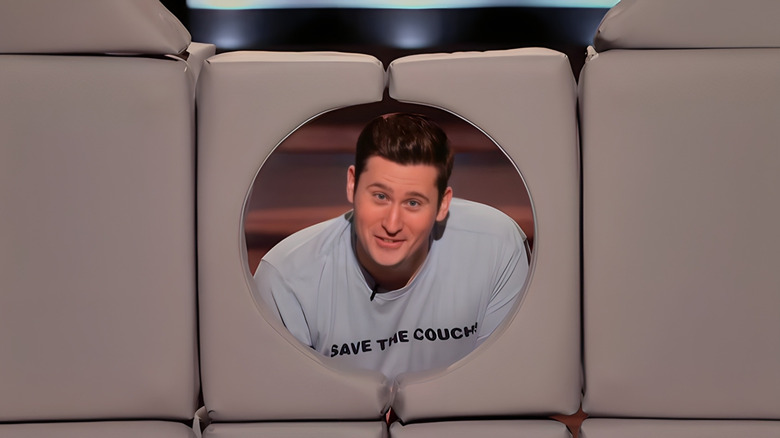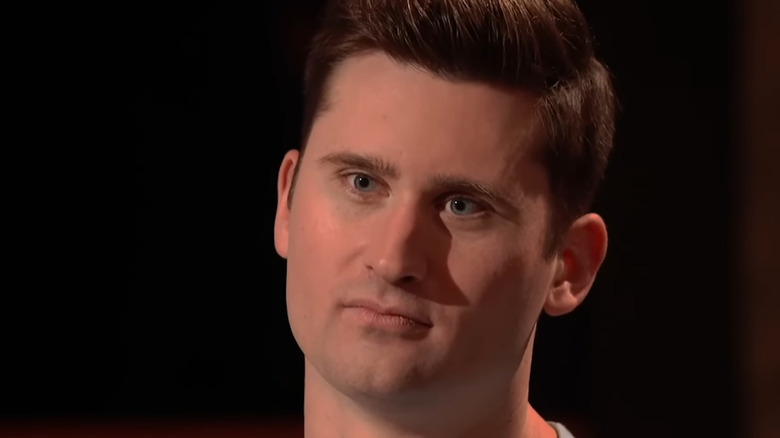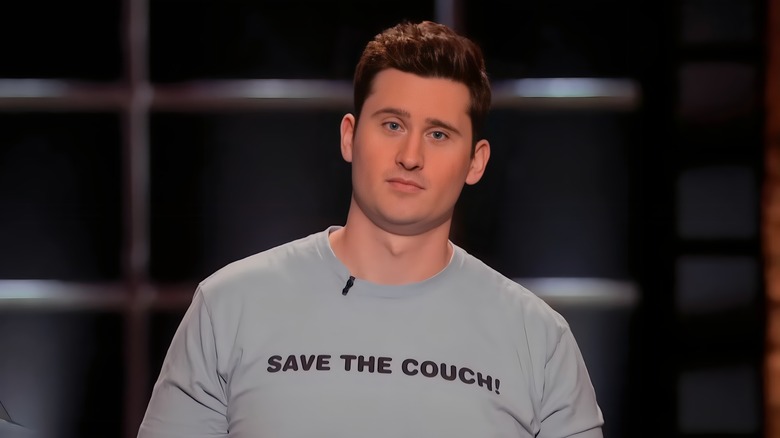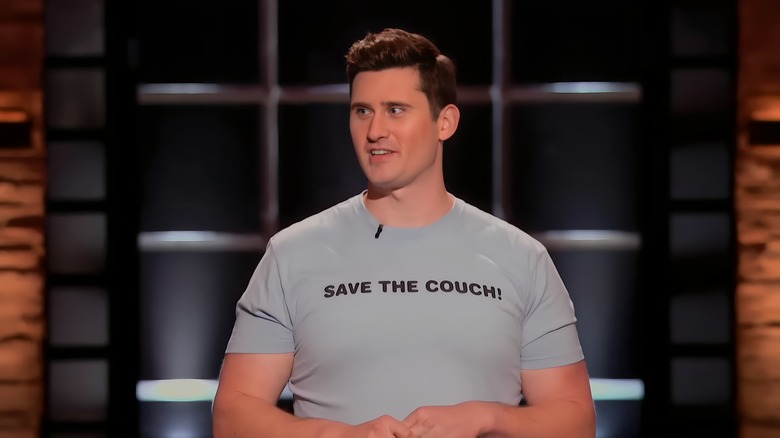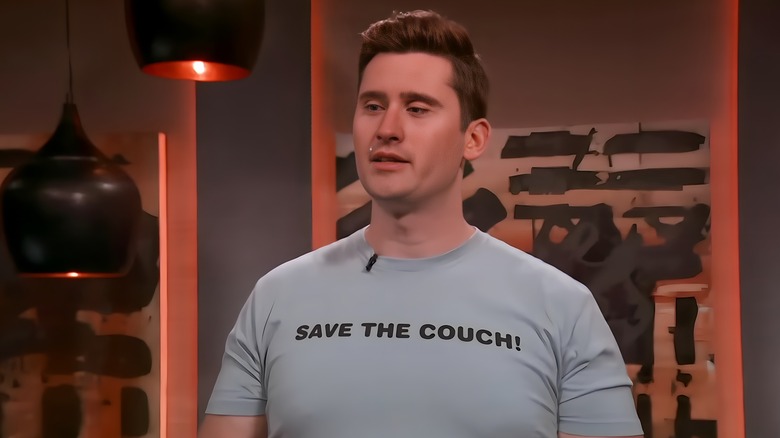Whatever Happened To FORT After Shark Tank?
Ambition is a key quality to have if you want to succeed on "Shark Tank." But unfortunately, even the most interesting of ideas won't fly unless you have a business plan that works. Conor Lewis launched FORT — a children's activity toy intended to save wear and tear on parents' couches by providing them with magnet-filled foam structures that could be stacked like a pillow fort via hidden magnets — during the COVID-19 pandemic. Lewis sadly learned the hard way that sometimes, sharp business acumen is more important than having a good idea. As of press time, FORT is currently out of business — and has left a trail of dissatisfied customers in its wake, upset by poor communication from the project's founders, frustrated by a lack of refunds, and waiting for products that haven't arrived.
Mark Cuban presciently noted that FORT's sad ending was foreseeable from the tale Lewis told during his episode. "You're a great case for what not to do as an entrepreneur. People can learn a lot from your experience," Cuban declared during the segment. The rest of the sharks could smell trouble coming and backed off after learning about the company's pre-ABC financial woes. Unfortunately, being turned down by the show's investors appears to have been the biggest highlight of FORT's life since its inception.
What happened to FORT on Shark Tank?
Conor Lewis appeared on Episode 18 of Season 13 of "Shark Tank." In the episode, he explains that he was inspired by the mess made by his own daughter while making pillow forts with couch cushions. Looking for a new direction after losing his job, he decided to extrapolate on the idea by creating FORT. He requests $500,000 in exchange for 10% of the company, and help with manufacturing and inventory assistance.
FORT blocks are made of couch cushion materials but are made to be played with. They can stack together to build all sorts of structures. Impressively, he explained that his FORT Kickstarter, which launched in January 2021, had made over $3 million, far beyond what he anticipated. But there were problems afoot in FORT-land; supply chain issues meant that Lewis had shipped a set of products but there were still sold units which he had not yet fulfilled due to unexpected overwhelming demand.
Lewis also reveals that he'd underpriced his FORT items when first offering them — units were sold for a median price of $269 when the cost and shipping totaled $250 per unit. The company was operating at a loss, and Lewis' solution to the problem was to keep selling the product at retail levels to cover his rising costs, a goal he could not meet. Lewis then admits that he'd given a partner a 5% stake in the company in return for his connections with no expected financial payback. He told the backer that he could increase that take to 40% if the company hit $30 million in sales. That causes many of the sharks to reconsider contributing to his business. One by one, they drop away, and Lewis leaves without a deal.
FORT after Shark Tank
FORT was already in trouble with a number of its customers when it made its "Shark Tank" appearance. Complaints regarding the product's quality and slow (or nonexistent) delivery were not ameliorated by FORT receiving even more publicity and thus more orders through their website. Several complaints about FORT had already been filed by consumers with the Better Business Bureau and the Consumer Product Safety Commission going back to 2021, the latter of which mainly concerned the safety of the blocks' magnetic pockets.
A number of backers posting to the Kickstarter comments section from 2022 onward said they never received the merchandise they pledged for, got the wrong objects without attaining a refund or replacement, received products of a lower quality than anticipated, did not receive requested refunds, or never got the add-ons they asked for. Others claim that the company's customer service department was not reachable by email. Some early backers said they hadn't received their merchandise after a two-year wait.
While Lewis may have proudly stated on "Shark Tank" that he made $2 million in FORT sales in 10 hours, actually getting the product out proved problematic. He had already offered his backers the choice between paying $99 for freight shipping to get their FORTs right away or waiting for the company to accrue enough profit to ship their products in late 2021. Lewis stated in a 2021 blog post as well as on Kickstarter that he was hoping to use retail purchases and new sales from customers to cover supply cost hikes and shipping costs, but this strategy appears to have been unsuccessful. When the publicity surrounding FORT was amped up by its "Shark Tank" appearance, the company's already taxed supply chain and backlogged order docket had to cope with even more tension.
Why did FORT go out of business?
In spite of the fact that the sharks didn't latch on to Conor Lewis' proposal, FORT continued to operate for a year after their "Shark Tank" appearance. Lewis even tried to launch an Indiegogo campaign for FORT Lite, a less expensive and lighter version of the concept in 2022, to the consternation of some of those already supporting FORT on Kickstarter. Unfortunately, the spotlight the reality show shined on the product resulted in a whole lot of publicity that the company seemingly couldn't keep up with — not exactly a case of the "Shark Tank Effect."
In a locked update posted to their Kickstarter in May 2023, FORT announced its closure and that it would be selling its remaining stock. While FORT maintains a website, a Facebook page, and an Instagram, none of these items have been updated since 2022, and most open comment sections are filled with complaints from customers furious that the company sold stock instead of using it to fulfill its Kickstarter promises.
Consumers expressed their outrage over their slights in a variety of forums. From Reddit to their own Facebook comments, they took to the internet looking for refunds for their pledges to FORT. This collective fury has resulted in Get The FORT LLC's parent company, Simulated Wood Grain Design LLC, receiving an F rating at the Better Business Bureau, with the latest of 88 complaints being filed in March 2023. Also, the BBB of Eastern & Southwest Missouri & Southern Illinois released a specific alert about the company in December 2021. The St. Louis Post-Dispatch also covered FORT's difficulties in 2021.
What's next for FORT's founders?
FORT's unfortunate demise leaves its founders looking for a new direction. Conor Lewis hasn't publicly announced a new game plan for himself and his family now that the company is gone. Perhaps he'll go back to the world of marketing and communications and resume his civilian, pre-FORT job. His LinkedIn has not been updated since his 2022 "Shark Tank" appearance. There's also no word as to whether or not FORT Lite reached any of its financial goals as of press time.
While FORT has been dogged by bad reviews, customer complaints, and other maladies, Lewis did try valiantly to make the company work for those who wanted a better toy for their kids. FORT stands as a lesson to any future moguls that maybe it's better to get an experienced hand on board to guide you through all of the financial lumps and bumps you might face when opening a brand-new business. Hopefully, Lewis will find better luck in his next venture.
